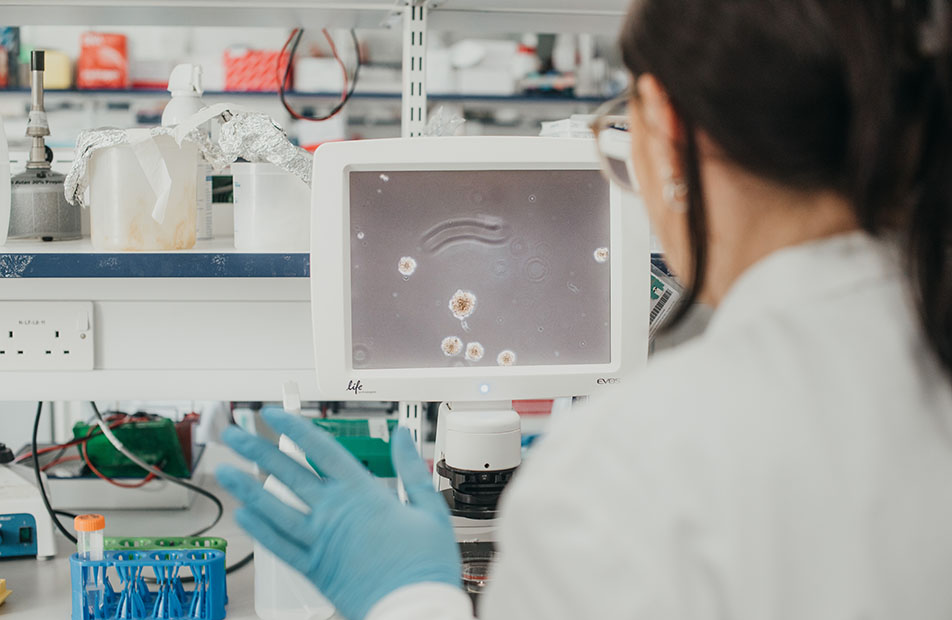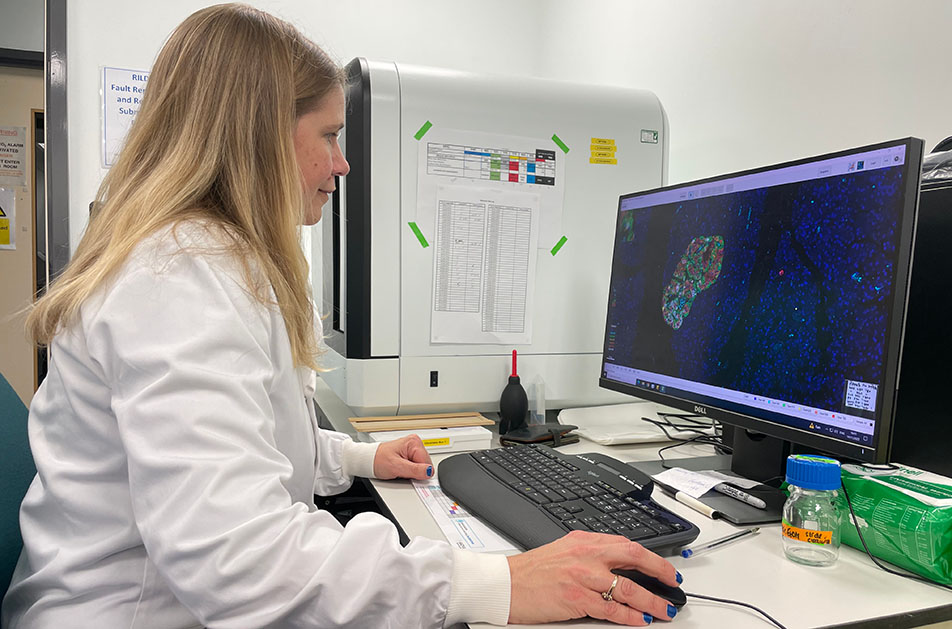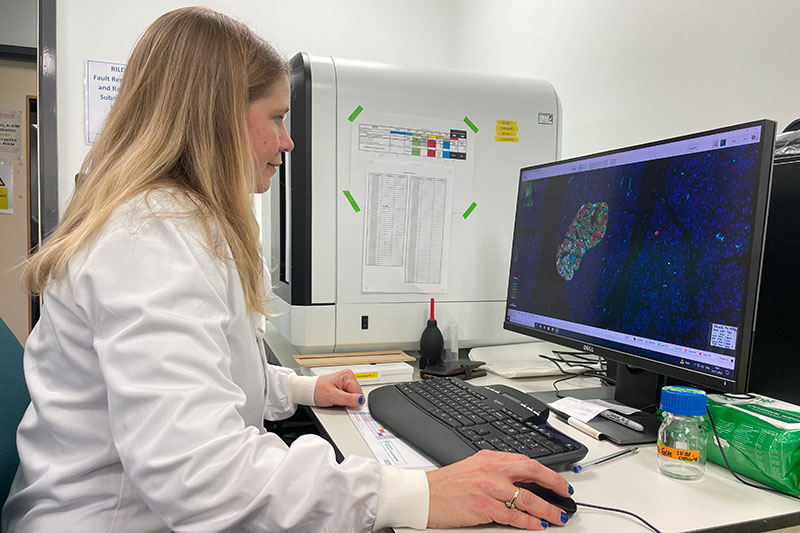
We are funding six new research projects worth over £2.7 million through the novel insulins challenge to transform type 1 diabetes treatment. This vital funding will accelerate the development of insulins that more closely mimic how a healthy pancreas works, which could improve the lives of people living with type 1 diabetes.
Developing novel insulins
Today’s announcement grants over £2.7 million to six new international research projects focused on developing next-generation insulins, also known as novel insulins. This crucial research, conducted at universities in the United States, Australia, and China, aims to design insulins that act faster and more precisely, relieving some of the burden of managing type 1 diabetes and reducing the risk of long-term complications.
People with type 1 diabetes can’t make their own insulin, so they must give themselves synthetic insulin several times each day to survive. But insulin is far from a cure for type 1 diabetes, and new forms of insulin are urgently needed.
Why do we need new insulins?
Blood glucose levels are affected by many factors including food intake, exercise, stress, other hormones, and even the weather. This complexity means that even with the most advanced technology available, many people with type 1 diabetes fluctuate between high and low glucose levels, resulting in short and long-term physical health issues. The relentless struggle to stabilise blood glucose with existing insulins can also be a significant mental burden for people living with type 1 diabetes.
Glucose-responsive ‘smart’ insulins
Four of these newly funded projects involve scientists creating and testing novel insulin formulations that can respond to changing blood glucose levels, known as glucose responsive insulins (GRIs). The concept of glucose responsive insulins is that the drug only becomes active when there is a certain amount of glucose in the blood to prevent hyperglycaemia (high blood glucose) and becomes inactive again when levels drop below a certain point, avoiding hypoglycaemia (low blood glucose).
Ultrafast acting insulin
Researchers running a fifth research project are developing a new ultrafast, short-acting insulin. Even with the fastest insulins that are currently available, there is still a delay between the drug being administered and the point it starts to act on glucose in the blood. This can result in blood glucose rising to unsafe levels before insulin can act to lower it. Faster insulins are also needed to improve the function of insulin pumps and hybrid closed loop technology, a system that relies on the stored insulin responding in real-time to changing blood glucose levels.
Combining insulin and glucagon
The final research project is focused on designing a protein that combines insulin with another hormone, glucagon. Unlike insulin, which helps remove glucose from the blood, glucagon stimulates the liver to release more glucose when levels in the blood run low. Having both hormones included in one formulation could keep blood glucose levels stable by working to prevent high and low blood glucose levels.
Dr Tim Heise, Vice Chair of our Novel Insulins Scientific Advisory Panel, said:
“Even with the currently available modern insulins, people living with type 1 diabetes have to put lots of effort into managing their diabetes every day to find a good balance between acceptable glycaemic control on the one hand and avoiding hypoglycaemia on the other. The funded six new research projects address major shortcomings in insulin therapy.
Glucose-responsive (so-called ‘smart’) insulins are regarded as the holy grail of insulin as they would come as close to a cure for type 1 diabetes as any drug therapy could. A truly rapid short-acting insulin might make it finally possible to progress from hybrid to fully closed loop systems, allowing a technological ‘cure’ for insulin-treated people with diabetes. Potentially minimising the risk of hypoglycaemia through an insulin-glucagon combination would ease one of the major concerns associated with insulin therapy today. Therefore, these research projects, if successful might do no less than heralding a new era in insulin therapy.”
Professor Simon Heller, Chair of our Scientific Advisory Panel, said:
“This unique funding is transforming the ability of global scientists to join forces to tackle type 1 diabetes. It enables researchers to set up new collaborations and to test innovative ideas which may lead to a step change in finding a cure for type 1 diabetes.”
Rachel Connor, Director of Research Partnerships at JDRF UK, said:
“With this funding programme we have challenged scientists around the world to drive forward new ideas in insulin design to combat the relentless burden of managing type 1 diabetes.
While insulin has been saving lives for over a hundred years now, and previous research has driven important changes for people with type 1, it is still not good enough – managing glucose levels with insulin is really tough, and it’s time for science to find ways to lift that burden.
By imagining a world where insulins can respond to changing glucose levels in real-time, we hope these six projects will help to create that new reality, relieving people with type 1 of the relentless demands that living with this condition places on them today.”
Dr Elizabeth Robertson, Director of Research at Diabetes UK, said:
“This much needed funding boost has the potential to revolutionise type 1 diabetes treatment. By supporting these groundbreaking research projects, we are aiming to develop new insulins that more closely mimic the body’s natural responses to changing blood sugar levels. This could significantly reduce the daily challenges of managing type 1 diabetes, and improve both the physical and mental health of those living with the condition. We are hopeful that this research will lead to life-changing advancements in type 1 diabetes care.”
The Type 1 Diabetes Grand Challenge returns to DUKPC
May 7, 2024
The Type 1 Diabetes Grand Challenge was the topic on everyone’s lips at this year’s Diabetes UK Professional Conference. Many of the large and growing community of Grand Challenge researchers were in attendance to celebrate their awards and update delegates on their research plans and progress.
The drive behind the Grand Challenge
The Grand Challenge session at this year’s DUKPC was chaired by Sally Morgan, a Trustee of the Steve Morgan Foundation, who opened with an emotive speech about her family’s journey with type 1 diabetes and their hope for a cure, and Professor Simon Heller, Chair of our Scientific Advisory Panels, who introduced the speakers, our three Senior Research Fellows.
Regrowing new beta cells
First up was Dr James Cantley, who began by explaining his ambitious drug discovery work to find a drug to regenerate the beta cells that have been destroyed by the immune attack. Sometimes the process of making new beta cells (neogenesis) is restored in adults, as a result of stress or injury. Dr Cantley and his team at the University of Dundee are modelling this process in the lab, and testing the effect different drugs have on it. Their aim is to find a drug that can support beta cell regrowth and be tested in clinical trials of people with type 1 diabetes.
Dr Cantley is also exploring how to encourage existing beta cells to reproduce. The immune attack on beta cells is gradual, meaning people with type 1 diabetes can still have surviving beta cells for some time after diagnosis. Dr Cantley hopes to find a way to make these remaining beta cells rapidly reproduce, a process called proliferation. Dr Cantley explained that a molecule called DYRK1A can trigger this process in the lab, and he plans to test this in mice with diabetes next. Dr Cantley said that to measure how well the treatment works, he’s building a huge microscope to view the whole mouse pancreas in high quality.
Dr Cantley said:
“This funding is a game-changer for innovative exploratory early research projects.”
Learn more about Dr Cantley’s Grand Challenge funded research.
Developing a protective coating for beta cells
Dr Vicky Salem was next to guide us through her vision for using biomaterials to keep beta cells safe from the immune attack in type 1 diabetes. Her team is developing a water-based jelly coating, known as a hydrogel, to protect lab-grown beta cells from the immune system once they’ve been transplanted into people with type 1. As well as acting as a protective shield, the aim is for the hydrogel to help connect beta cells to a blood supply so they can thrive after transplantation.
Dr Salem was joined by research team member PhD student Rea Tresa, who explained the sophisticated approach to encapsulating (coating) beta cells in the hydrogel, which involves 3D bioprinting. Oil and water are squirted together to form coatings around clusters of beta cells called islets, which then flow through a complex structure of cells and hydrogels which supports a blood supply but does not give access to the immune system.
Dr Salem said:
“Fellowships like this one support clinicians to engage with science for the benefit of patients.”
Learn more about Dr Salem’s Grand Challenge funded research.
Are islets surrendering or fighting back?
Professor Sarah Richardson was the last to share her research updates. Her project has three goals: to better understand how islets are attacked; to enhance islets’ defences; and to help other research groups to bridge the gap between the lab and the clinic, by validating their findings in human pancreases.
By examining rare human pancreas samples in incredible detail, Professor Richardson and her team are currently investigating the role of the protective barrier that forms around islets when the pancreas is developing in early life. And how easily the immune system is able to break it down, depending on the age a person develops type 1 diabetes. The aim is to understand why type 1 diabetes tends to be more aggressive in people diagnosed before the age of 12 years.
Telling us more about islets’ defence mechanisms, Prof Richardson also explained that there’s a protein on the surface of islets called HLA1 which makes them visible to the immune system. Another type of HLA1 helps to protect the islets. Prof Richardson’s team has found how islets release this protective HLA1 protein and is working on how to harness this process to protect islets in people with type 1.
Prof Richardson said:
“We have examined more pancreas samples from people with type 1 diabetes than anywhere else in the world.”
Learn more about Professor Richardson’s Grand Challenge funded research.
Welcoming new faces
Collaboration and community are at the heart of the Grand Challenge, so we celebrated the latest researchers to join the team. We now support over 100 researchers and collaborators working across at least 30 institutions in the UK and further afield. And even more will be joining the race to find new treatments and a cure for type 1 later this year when we announce the outcomes of our latest funding calls.

Amplifying voices
Diabetes UK’s Patient and Public Involvement Lead and JDRF UK’s Director of Research Partnerships spoke at the conference about how the Grand Challenge is taking a pioneering approach to involvement. From its outset, the Grand Challenge has been committed to involving people with lived experience of type 1 diabetes in all stages of the research life cycle. This means we can be confident that the research we fund is important, meaningful, and has the biggest potential to transform the lives of people with type 1 diabetes.
We’re grateful to our Type 1 Diabetes Research Panel members, who generously give their time to help researchers better understand the reality of living with type 1, to optimise the design, delivery, and dissemination of their research.

Empowering tomorrow’s leaders
We were delighted to be joined by a handful of Young Leaders from Diabetes UK’s Together Type 1 programme, also funded by the Steve Morgan Foundation. Together Type 1 is a community for children and young people aged 11-25 living with type 1 diabetes, enabling them to make new friends, learn new skills, and build confidence.
We brought Grand Challenge researchers and Young Leaders together in conversation, and discussed everything from career advice to diabetes research that holds the most promise to improve lives. We’ll be hearing directly from the Young Leaders about their time at DUKPC in the coming weeks.
Accelerating faster
Excitement is building around the Grand Challenge as the pace picks up and more researchers join the race towards a cure for type 1 diabetes. After three packed days hearing the latest research updates, celebrating a growing scientific community, and empowering more people with type 1 to get involved, it’s clear the Grand Challenge is building momentum to move us closer towards a future where the relentless burden of type 1 diabetes is a thing of the past.
You may also be interested in
Research into replacing insulin-producing cells is advancing rapidly, with ‘arm pancreas’ trial announced
March 21, 2024
Using a technique co-invented by Professor Matthias Hebrok, one of the Grand Challenge Scientific Advisory Panel Vice Chairs, researchers are exploring a promising treatment for type 1 diabetes in a new clinical trial, involving transplanting insulin-producing beta cells into the forearm, creating an ‘arm pancreas’.
Revolutionising research into beta cell replacement
Globally, research focused on replacing insulin-producing beta cells, which are destroyed in type 1 diabetes, is advancing rapidly. US biotech company Minutia is developing technology for a new clinical trial, supported by three non-dilutive funders, California’s Stem Cell Agency, JDRF International, and the National Institute of Health, and is working collaboratively with the University of California, San Francisco, and Duke University.
The two-part trial involves transplanting clusters of islets, that contain insulin-producing beta cells, into the forearms of eight participants, creating an ‘arm pancreas’. In the first phase, cells from donors have been successfully transplanted, while the second phase aims to use cells grown in the lab from stem cells, in much larger quantities.
Co-founder of Minutia Professor Hebrok, at the Technical University of Munich and Helmholtz Munich, said that while islet transplants from donors have already seen success, there’s a critical shortage of donors, meaning that only a tiny fraction of people with type 1 diabetes can currently benefit from a transplant.
Professor Hebrok said:
“I think the stem cell-derived cells are a revolution. Of course, we’re at the very early stages. But we could generate as many cells as we would like, to treat a tremendous number of patients.”
A growing community
The Type 1 Diabetes Grand Challenge is investing £30 million into the most cutting-edge projects in beta cell therapies. The diabetes research community is optimistic about the field’s potential to end the constant insulin dosing and blood sugar monitoring that people living with type 1 diabetes currently have to endure.
Professor Hebrok is Vice Chair of the Grand Challenge Scientific Advisory Panel advising on the research stream focused on beta cell replacement therapies. With funding from the Grand Challenge, there are now more than 70 researchers and collaborators working to grow, replace, and protect beta cells, so that people with type 1 diabetes can make their own insulin again. It’s encouraging to see the beta cell research community grow, with more researchers exploring creative new approaches that are moving us closer to a cure for type 1 diabetes.
Dr Lucy Chambers, Head of Research Communications at Diabetes UK, said:
“Cutting-edge cell therapies that enable people with type 1 diabetes to make their own insulin again are within reach.
“While there’s still much work to do to get these into clinical practice, programmes such as the UK’s Type 1 Diabetes Grand Challenge, are bringing us closer to the day when living with type 1 diabetes no longer requires relentless, round-the-clock self-management, and short- and long-term complications are a thing of the past.”
You may also be interested in
Type 1 Diabetes Grand Challenge round-up 2023
December 14, 2023
The Type 1 Diabetes Grand Challenge is providing a vital boost for UK diabetes research to find new treatments and cures for type 1 diabetes, faster. We are rallying the brightest minds around the UK and beyond to find ways to transform quality-of-life for the millions of people worldwide who live with type 1.
During 2023, the values at the heart of the Grand Challenge, speed, innovation, collaboration and ambition, have been clear. We made our first funding awards to nine diabetes research teams with big ideas, investing over £18 million to accelerate progress. While we’ve also been building vital capability within the diabetes research landscape, and nurturing creativity and collaboration in our three research priorities.
Here, we highlight what we’ve made happen in 2023.
Readying the starting blocks
To ensure we fuel research with the greatest possible potential to change the lives of people with type 1 diabetes, we enlisted the help of the world’s leading type 1 diabetes research experts. They sit on our Scientific Advisory Panels and work tirelessly to make sure our funding calls attract the best researchers with the most promising ideas.
This year, we’ve launched five new calls – asking scientists to develop ambitious and innovative research proposals and apply for our funding in each of the three Grand Challenge areas.
In February, we launched the first of our funding calls to accelerate research into the root causes of type 1 and ways to replace insulin-making beta cells, so that new treatments can make a difference to people with type 1 diabetes sooner. Next, we announced our plans to establish a flag-ship beta cell production and distribution centre, to ensure a supply of stem cell-derived beta cells for researchers in the UK.
With ambition, innovation and collaboration at the heart of the Type 1 Diabetes Grand Challenge, later in the year we called on scientists to push boundaries even further. Our Novel Insulins funding call is currently open and calling for bold ideas and innovations in insulin-based medicines from both academics and small-medium sized businesses, working across a range of disciplines from biotechnology to pharmacology. While our Beta Cell Therapy Innovations call is open for applications too. It’s seeking high-risk, high-reward ideas and new perspectives to support visionary ideas that could transform the field if successful.
Building momentum and collaboration
To prepare the research community for the Grand Challenge’s new and exciting way of funding research, we hosted first-of-a-kind networking events.
In May we held a virtual symposium on novel insulins research. The symposium provided a platform for researchers, policy makers and industry experts from around the world to share insights and expertise on the latest breakthroughs in novel insulin therapies.
Then in November, we held a networking workshop with scientists with diverse expertise, designed to spark cross disciplinary collaborations and fresh ideas, with the potential to overcome the roadblocks holding back progress in beta cell therapy research.
£18 million awarded so far
The response from the scientific community this year has been staggering, giving our expert advisory panels of scientists and people with lived experience of type 1 plenty of pioneering proposals to rigorously scrutinise and review.
In March, we announced the first projects awarded by the Type 1 Diabetes Grand Challenge. £5 million went to three exceptional researchers, who become our first Senior Research Fellows. Dr James Cantley at the University of Dundee, will test new drugs to help people grow back their own beta cells. Dr Victoria Salem at Imperial College London,will develop a device that can be implanted into people with type 1 diabetes to deliver new beta cells. Professor Sarah Richardson at the University of Exeter, will explore how and why a person’s immune system destroys their own beta cells.
Then in December, we announced Grand Challenge funding of over £13 million for a further six research projects. Two of these projects will investigate how to tackle the immune system attack at the root of type 1 diabetes using promising new treatments, called immunotherapies, which could prevent or slow the condition. The remaining four projects will tackle the challenge of replacing insulin-producing beta cells. Three research teams will aim to improve the quality, functionality and survival of the beta cells we can develop in the lab, while the final team aim to make islet transplants from donors more effective.
Looking ahead to 2024
With the outstanding new research teams our funding has forged, in hand with wider collaborative community our panels, events and patient and public engagement work have built, the pace is set. In 2024, we’ll be announcing the first funding awards in the Novel Insulins research theme, along with the outcome of our call for innovative beta cell therapy ideas. We’ll also be reporting on progress from the groundbreaking research projects already underway. And we look forward to an exciting programme of activity that will continue to stimulate bold, innovative research at scale and create the change needed to improve the lives of millions of people with type 1 diabetes.
Keep your eye on the News and Views section of our website for live updates on the Grand Challenge.
You may also be interested in
Type 1 Diabetes Grand Challenge invests £13 million into six transformational new projects
December 7, 2023
We’re thrilled to unveil the latest groundbreaking research projects funded by the Type 1 Diabetes Grand Challenge. Earlier this year, we called on scientists to submit research proposals to get us closer to having new treatments for people with type 1 diabetes that tackle the root cause of their condition and restore their insulin-making beta cells.
Now, over £13 million of funding will support six outstanding research teams – made up of 49 scientists, working at 22 different institutions in the UK and Europe – to fast-track discoveries that could see us make huge strides in how we treat type 1 diabetes.
Helping people make their own insulin
To cure type 1 diabetes, we need to find a way to give people with type 1 diabetes new beta cells that work to precisely control their blood sugar levels. Four of our new projects will innovate new ways of reaching this goal.
Beta cells: replace, protect, regenerate
Professor David Hodson, at University of Oxford, Dr Ildem Akerman, at University of Birmingham, and Dr Johannes Broichhagen, at Leibniz FMP, will lead a team to explore how insulin-boosting molecules that sit on the surface of beta cells could be harnessed to create beta cells in the lab that work better and survive for longer.
They’ll also investigate if the molecules can be used to deliver treatments that help to protect transplanted beta cells from the immune system or trigger new beta cells to grow inside the body, by encouraging other cells in the pancreas to transform into beta cells.
Find out more about the team’s project.
Bolstering beta cells ready for transplantation
Professor Shanta Persaud and Dr Aileen King, at King’s College London, and team will work to create an unlimited supply of elite beta cells ready for transplant. They’ll draw on their expert knowledge in how the human pancreas works and develops, and apply this to making beta cells from stem cells in the lab. As they grow their beta cells, they’ll bolster them with specialised support cells and helpful nutrients that will encourage them to fully develop so they can respond to changing blood sugar levels just as well as real beta cells do.
Find out more about the team’s project.
Creating a better home for transplanted beta cells
Professor Francesca Spagnoli and Dr Rocio Sancho at King’s College London, together with Professor Molly Stevens at University of Oxford, will focus on ways to keep lab-made beta cells safe from harm. They’ll use cutting-edge technology to boost beta cells’ chances of survival once transplanted by coating them with protective gels and using nanoparticle technology to create a synthetic microenvironment to protect them from stress and immune attack.
The team will also develop a transplantation device that beta cells can live inside, to protect them from the hostile environment they’ll face once transplanted inside the body.
Find out more about the team’s project.
Unleashing the benefits of cell transplants
Professor Shareen Forbes, at University of Edinburgh, and Dr Lisa White, at University of Nottingham, will spearhead a team to search for ways to boost the benefits of donor beta cells transplants (called islet transplants). They’ll investigate if delivering drugs packaged inside microcapsules alongside islet transplants helps the donated beta cells produce more insulin and survive for longer. This would make islets transplants more effective and mean many more people with type 1 diabetes could benefit.
Finally, the team will investigate if this approach could be applied to beta cells made from stem cells.
Find out more about the team’s project.
Stopping the immune attack’s harm
In people living with type 1 diabetes, the immune system remains primed to seek out and destroy beta cells. To ensure the survival of any new beta cells transplanted into people with type 1, protection from the immune system is critical. Two projects from our latest multi-million-pound investment are focused on promising new immunotherapy treatments, which fend off the immune attack in type 1 diabetes.
Immunotherapy: is timing everything?
Dr James Pearson, at Cardiff University, and his team will investigate if the time of day when we give an immunotherapy can affect how well it works. They’ll study a type of immunotherapy drug named interleukin-2 (IL-2). It works by expanding the population of helpful immune cells, called regulatory T cells (Tregs), which try to prevent killer immune cells from launching their attack. Dr Pearson has found evidence that Tregs respond differently to IL-2 depending on the time of day and will now explore this further.
The findings could help to improve the effectiveness of a promising immunotherapy for people with and at risk of type 1 diabetes by identifying the best time of day to give the treatment.
Find out more about the team’s project.
Are two immunotherapies better than one?
Dr Danijela Tatovic, at Cardiff University, will head a team to explore if combining two immunotherapies that target different parts of the immune system could make them more effective at protecting beta cells.
They’ll run a clinical trial testing the immunotherapies abatacept and IL-2 with people recently diagnosed with type 1 diabetes, who still have some surviving beta cells. Their findings will tell us how best to combine the drugs and will lay the groundwork for a bigger trial, which could build the evidence needed to make this combination treatment available for people with or at risk of type 1 diabetes.
Find out more about the team’s project.
Dr Elizabeth Robertson, Director of Research at Diabetes UK, said:
“We’re in a hugely exciting period for the Type 1 Diabetes Grand Challenge, as today we welcome six exceptional scientists who will lead exciting multi-disciplinary teams to drive forward this pioneering initiative and build momentum towards our ambitious goal.
“This announcement brings with it fresh hope of a cure for everyone living with type 1 diabetes, and we look forward to seeing how these projects will break new ground in our search for life-changing beta cell therapies and treatments to overcome the type 1 immune system attack.”
Rachel Connor, Director of Research Partnerships at JDRF UK, said:
“Today’s announcement of six newly funded research projects demonstrates the speed and ambition of the Type 1 Diabetes Grand Challenge. All six projects hold great promise for people with type 1 diabetes. We can’t wait to see the results of this vital research to transform beta cell therapy and tackle the immune reaction that is at the root of driving type 1.”
Steve and Sally Morgan, Founders of the Steve Morgan Foundation, said:
“This is an exciting moment in our partnership with Diabetes UK and JDRF UK. We are astounded by the innovation and vision of the new projects and look forward to seeing how the research helps us realise our ambition of transforming the lives of people with type 1 diabetes.”
Our latest awards take the total amount of funding the Type 1 Diabetes Grand Challenge has awarded in 2023 to over £18 million, following the Steve Morgan Foundation’s momentous £50 million pledge. We’ll keep you updated on the progress of this extraordinary research as our growing squad of scientists help us step closer to a cure.
You may also be interested in
£1 million available to ignite beta cell therapy innovations
December 5, 2023
Today sees the opening of a new Type 1 Diabetes Grand Challenge funding call focused on supporting innovations into beta cell therapies for people with type 1 diabetes.
Following our networking workshop last week, designed to spark cross disciplinary collaborations and fresh thinking into beta cell therapy research, we’re offering individual awards of up to £400,000. We want to support visionary research that will transform the field, by embracing high-risk, high-reward proposals. New and creative ideas that will address an unmet need in beta cell therapy research are strongly encouraged.
We also know that drawing on expertise from beyond type 1 diabetes could unlock innovations to overcome current obstacles. That’s why we’re encouraging multi-disciplinary collaboration and are calling on researchers from any discipline, including immunology, stem cell science, medicinal chemistry or bioengineering, to get involved.
Diabetes UK and JDRF have worked with the Grand Challenge Scientific Advisory Panels, comprising some of the world’s most eminent type 1 diabetes scientists, to shape this new call.
Apply for funding
Find out more and apply for the Beta Cell Therapy Innovation Project Grant.
Researchers will be asked to submit a brief research plan, including a short video pitch, by February 19th 2024. The very best applicants will then be invited to a virtual interview.
Diabetes UK and JDRF are passionate about working closely with people affected by type 1 diabetes and encourage all applicants to do the same when building their applications.
If you’re a researcher and want to learn more about the Beta Cell Therapy Innovation Project Grant call, including top tips for applying, sign up to our webinar on December 14th.
Professor Qizhi Tang, a member of our Scientific Advisory Panel on beta cell therapies, said:
“Recent advances in stem cell technology and cell engineering have provided an unprecedented opportunity to restore beta cell function in people with type 1 diabetes. The Type 1 Diabetes Grand Challenge is a momentous call to action to work together to advance this therapy.”
You may also be interested in
£1 million available to ignite beta cell therapy innovations
November 28, 2023
Today sees the opening of a new Type 1 Diabetes Grand Challenge funding call focused on supporting innovations into beta cell therapies for people with type 1 diabetes.
Following our networking workshop last week, designed to spark cross disciplinary collaborations and fresh thinking into beta cell therapy research, we’re offering individual awards of up to £400,000. We want to support visionary research that will transform the field, by embracing high-risk, high-reward proposals. New and creative ideas that will address an unmet need in beta cell therapy research are strongly encouraged.
We also know that drawing on expertise from beyond type 1 diabetes could unlock innovations to overcome current obstacles. That’s why we’re encouraging multi-disciplinary collaboration and are calling on researchers from any discipline, including immunology, stem cell science, medicinal chemistry or bioengineering, to get involved.
Diabetes UK and JDRF have worked with the Grand Challenge Scientific Advisory Panels, comprising some of the world’s most eminent type 1 diabetes scientists, to shape this new call.
Apply for funding
Find out more and apply for the Beta Cell Therapy Innovation Project Grant.
Researchers will be asked to submit a brief research plan, including a short video pitch, by February 19th 2024. The very best applicants will then be invited to a virtual interview.
Diabetes UK and JDRF are passionate about working closely with people affected by type 1 diabetes and encourage all applicants to do the same when building their applications.
If you’re a researcher and want to learn more about the Beta Cell Therapy Innovation Project Grant call, including top tips for applying, sign up to our webinar on December 14th.
Professor Qizhi Tang, a member of our Scientific Advisory Panel on beta cell therapies, said:
“Recent advances in stem cell technology and cell engineering have provided an unprecedented opportunity to restore beta cell function in people with type 1 diabetes. The Type 1 Diabetes Grand Challenge is a momentous call to action to work together to advance this therapy.”
You may also be interested in
£1 million available to ignite beta cell therapy innovations
September 5, 2023
Today sees the opening of a new Type 1 Diabetes Grand Challenge funding call focused on supporting innovations into beta cell therapies for people with type 1 diabetes.
Following our networking workshop last week, designed to spark cross disciplinary collaborations and fresh thinking into beta cell therapy research, we’re offering individual awards of up to £400,000. We want to support visionary research that will transform the field, by embracing high-risk, high-reward proposals. New and creative ideas that will address an unmet need in beta cell therapy research are strongly encouraged.
We also know that drawing on expertise from beyond type 1 diabetes could unlock innovations to overcome current obstacles. That’s why we’re encouraging multi-disciplinary collaboration and are calling on researchers from any discipline, including immunology, stem cell science, medicinal chemistry or bioengineering, to get involved.
Diabetes UK and JDRF have worked with the Grand Challenge Scientific Advisory Panels, comprising some of the world’s most eminent type 1 diabetes scientists, to shape this new call.
Apply for funding
Find out more and apply for the Beta Cell Therapy Innovation Project Grant.
Researchers will be asked to submit a brief research plan, including a short video pitch, by February 19th 2024. The very best applicants will then be invited to a virtual interview.
Diabetes UK and JDRF are passionate about working closely with people affected by type 1 diabetes and encourage all applicants to do the same when building their applications.
If you’re a researcher and want to learn more about the Beta Cell Therapy Innovation Project Grant call, including top tips for applying, sign up to our webinar on December 14th.
Professor Qizhi Tang, a member of our Scientific Advisory Panel on beta cell therapies, said:
“Recent advances in stem cell technology and cell engineering have provided an unprecedented opportunity to restore beta cell function in people with type 1 diabetes. The Type 1 Diabetes Grand Challenge is a momentous call to action to work together to advance this therapy.”
£1 million available to ignite beta cell therapy innovations
June 22, 2023
Last month, we held a symposium on novel insulins, where experts from around the world met virtually to discuss their ideas for how to develop the next generation of insulins. Their fascinating discussion will be published in a scientific review paper later this year. In the meantime, here is a preview of five of the most exciting ideas that were discussed at the symposium.
Today sees the opening of a new Type 1 Diabetes Grand Challenge funding call focused on supporting innovations into beta cell therapies for people with type 1 diabetes.
Following our networking workshop last week, designed to spark cross disciplinary collaborations and fresh thinking into beta cell therapy research, we’re offering individual awards of up to £400,000. We want to support visionary research that will transform the field, by embracing high-risk, high-reward proposals. New and creative ideas that will address an unmet need in beta cell therapy research are strongly encouraged.
We also know that drawing on expertise from beyond type 1 diabetes could unlock innovations to overcome current obstacles. That’s why we’re encouraging multi-disciplinary collaboration and are calling on researchers from any discipline, including immunology, stem cell science, medicinal chemistry or bioengineering, to get involved.
Diabetes UK and JDRF have worked with the Grand Challenge Scientific Advisory Panels, comprising some of the world’s most eminent type 1 diabetes scientists, to shape this new call.
Apply for funding
Find out more and apply for the Beta Cell Therapy Innovation Project Grant.
Researchers will be asked to submit a brief research plan, including a short video pitch, by February 19th 2024. The very best applicants will then be invited to a virtual interview.
Diabetes UK and JDRF are passionate about working closely with people affected by type 1 diabetes and encourage all applicants to do the same when building their applications.
If you’re a researcher and want to learn more about the Beta Cell Therapy Innovation Project Grant call, including top tips for applying, sign up to our webinar on December 14th.
Professor Qizhi Tang, a member of our Scientific Advisory Panel on beta cell therapies, said:
“Recent advances in stem cell technology and cell engineering have provided an unprecedented opportunity to restore beta cell function in people with type 1 diabetes. The Type 1 Diabetes Grand Challenge is a momentous call to action to work together to advance this therapy.”
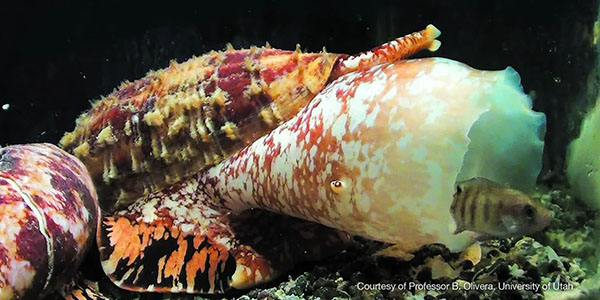
A cone snail attacking a fish
Because insulin is such a big molecule, it can take a while to act. Scientists have been trying to make insulin smaller without losing any of its function, but they haven’t been successful yet. Now, researchers including Professor Daniel Chou from Stanford University are trying to mimic the chemical structure of cone snail insulin venom and tweak it slightly to improve its effectiveness in people.
If these researchers manage to create this smaller version of insulin, our skin should be able to absorb it much faster than current insulins. Ultra-fast insulins like this would reduce the time you need to wait between injecting and eating and also offer hope for fully closed loop systems, which don’t require a person to give warning of meals and exercise.
2. Oral insulin pill inspired by tortoises
The problem with taking insulin orally in a pill also partially comes down to its size. If you were to swallow a pill of insulin, it would first break down in your stomach, meaning it couldn’t work properly, and even then, it would still be too big to pass through your intestines. But world-renowned scientist Professor Robert Langer at Massachusetts Institute of Technology (MIT) has developed an ingenious pill that protects insulin and then fires it into the stomach lining.
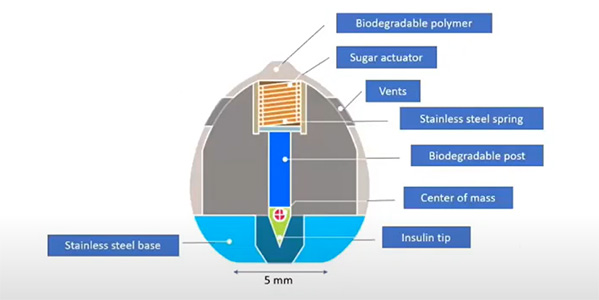
A diagram of Professor Langer’s insulin pill design
The clever design features a tiny spring which propels an arrow of insulin directly into the stomach lining. This happens about an hour after you swallow the device, which is packed inside a biodegradable case, to allow time for it to reach the stomach. But how do you make sure the insulin is always fired into the stomach wall? That’s where the tortoises come in.
A species called the leopard tortoise is self-orienting, which means that it always stays upright. No matter how the tortoise falls or rolls, it will always end up on its feet. This clever trick is due to how its weight is distributed. Inspired by these tortoises, Professor Langer distributed the weight in his insulin pill in the same way so that it always lands with the insulin pointed down.
His pill is called SOMA (self-oriented medical applicator) and Novo Nordisk has so far tested it in 65 people with type 1 diabetes and found no bad side effects.

A leopard tortoise
3. A weekly insulin could be coming
People with type 1 currently take a type of slow-acting insulin, known as basal insulin, once or twice a day to control blood sugar outside of eating. Researchers are developing a new generation of insulins that can work for even longer, reducing the number of injections you need. It may seem counterintuitive, but by editing insulin to make it less effective at clearing glucose, researchers can make it work for longer. This reduced function means it can stay in the body without causing hypoglycaemia.
Novo Nordisk have used this principle to create an insulin called insulin isodec, which has had very promising results in clinical trials. The company has now applied to the US Food and Drug Administration (FDA) for regulatory approval, meaning weekly basal insulin injections could soon become a reality for people with diabetes.
4. Ways to make insulin respond to glucose
Scientists specialising in different disciplines from chemistry to bioengineering have inventive ideas about how to create glucose-responsive insulins, also known as smart insulins. An interesting idea is to create a mixture of insulin and a chemical that can sense glucose, with a large molecule to keep them together.
A team led by Professor Matthew Webber at the University of Notre Dame has developed such a mixture. The insulin mixture is an insoluble blob at a neutral pH, which means not acidic or alkaline. Then, when glucose levels rise, the pH becomes more acidic and the mixture dissolves, releasing the insulin so that it can bind to glucose. Their tests on animals have shown that a single dose of their smart insulin mixture can keep glucose levels stable for up to five days in mice and up to a week in pigs.
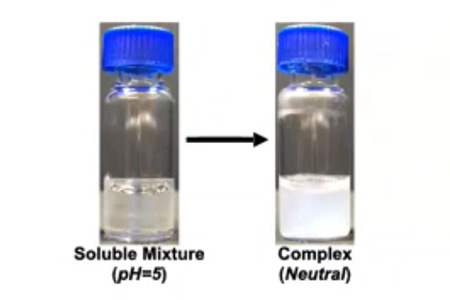
The glucose-responsive insulin mixture in its soluble state and its insoluble state
5. Computer models to streamline research
Treatments must be tested in animals before they can enter clinical trials with people. But lots of drugs that are effective in animals turn out not to work in humans. Professor Michael Strano and his team at MIT have developed a sophisticated computer model of the glucose control system in animals and humans, which can predict how the body will respond to different treatments. The team created the simulation using a combination of maths, biochemistry and extensive data collection from people with type 1.
Researchers can plug their drug designs into the computer model to predict whether it will work or not and edit their designs accordingly. This tool is especially useful for glucose-responsive ‘smart’ insulins because scientists all over the world are experimenting with a range of different approaches to develop them. The simulator will streamline the research process by allowing researchers to only invest time and energy in their ideas that have the best chance of success. It will save crucial time, money and effort in the research and development stage and ensure only the insulins (and other therapies for type 1) with the most potential progress to clinical trials.
Bonus: glucose-responsive glucagon
We can apply all of these ideas for creating glucose-responsive insulin to the hormone glucagon, which has the opposite effect to insulin. Glucagon stimulates glucose production and release from where it is stored in the liver, which is why it is a treatment for severe hypoglycaemia.
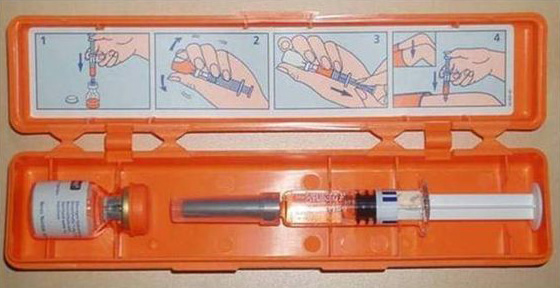
A glucagon emergency rescue kit to treat severe hypos
Dr Alborz Madavi, a researcher who founded the company Protomer, believes that a long-acting dose of glucose-responsive glucagon, which could be taken just once a week, would protect against hypoglycaemia. The smart glucagon would turn on at low glucose levels to prevent hypos and work alongside the user’s normal insulin treatment. Dr Mahdavi believes this would help people with type 1 feel less worried about overnight hypos and allow more flexibility with taking insulin.
Type 1 Diabetes Grand Challenge offers hope for novel insulins
The £15 million set aside by the Type 1 Diabetes Grand Challenge to tackle the challenge of novel insulins will expand upon this exciting research to bring these innovative ideas closer to reality. From hormones that can respond to varying glucose levels, to fast- and long-acting insulin, to easier ways to take insulin without injections, novel insulins are coming, and the Grand Challenge will get us there faster.
£1 million available to ignite beta cell therapy innovations
May 19, 2023
Today sees the opening of a new Type 1 Diabetes Grand Challenge funding call focused on supporting innovations into beta cell therapies for people with type 1 diabetes.
Following our networking workshop last week, designed to spark cross disciplinary collaborations and fresh thinking into beta cell therapy research, we’re offering individual awards of up to £400,000. We want to support visionary research that will transform the field, by embracing high-risk, high-reward proposals. New and creative ideas that will address an unmet need in beta cell therapy research are strongly encouraged.
We also know that drawing on expertise from beyond type 1 diabetes could unlock innovations to overcome current obstacles. That’s why we’re encouraging multi-disciplinary collaboration and are calling on researchers from any discipline, including immunology, stem cell science, medicinal chemistry or bioengineering, to get involved.
Diabetes UK and JDRF have worked with the Grand Challenge Scientific Advisory Panels, comprising some of the world’s most eminent type 1 diabetes scientists, to shape this new call.
Apply for funding
Find out more and apply for the Beta Cell Therapy Innovation Project Grant.
Researchers will be asked to submit a brief research plan, including a short video pitch, by February 19th 2024. The very best applicants will then be invited to a virtual interview.
Diabetes UK and JDRF are passionate about working closely with people affected by type 1 diabetes and encourage all applicants to do the same when building their applications.
If you’re a researcher and want to learn more about the Beta Cell Therapy Innovation Project Grant call, including top tips for applying, sign up to our webinar on December 14th.
Professor Qizhi Tang, a member of our Scientific Advisory Panel on beta cell therapies, said:
“Recent advances in stem cell technology and cell engineering have provided an unprecedented opportunity to restore beta cell function in people with type 1 diabetes. The Type 1 Diabetes Grand Challenge is a momentous call to action to work together to advance this therapy.”
______Content of this video______
00:00:00 Introduction to the Novel Insulins Symposium – Professor Simon Heller
00:06:04 Discovery and design of novel insulins – Dr Peter Kurtzhals
00:38:41 Glucose-responsive smart insulin and delivery patch – Professor Zhen Gu
01:09:05 Molecular Engineering of Insulin: Progresses and Challenges – Professor Daniel Chou
01:35:33 Molecular engineering of glucose-responsive insulin – Professor Matthew Webber
02:07:00 Towards oral insulin and an artificial pancreas – Professor Robert Langer
02:26:03 Ultra-stable insulin analogs and their clinical applications – Professor Michael Weiss
02:55:22 Glucose-sensing insulins – Dr Alborz Mahdavi
03:31:42 Diabetes therapeutics from computational design – Professor Michael Strano
03:59:00 Discussion Panel – All speakers
04:36:42 Concluding remarks and next steps – Ms Rachel Connor


